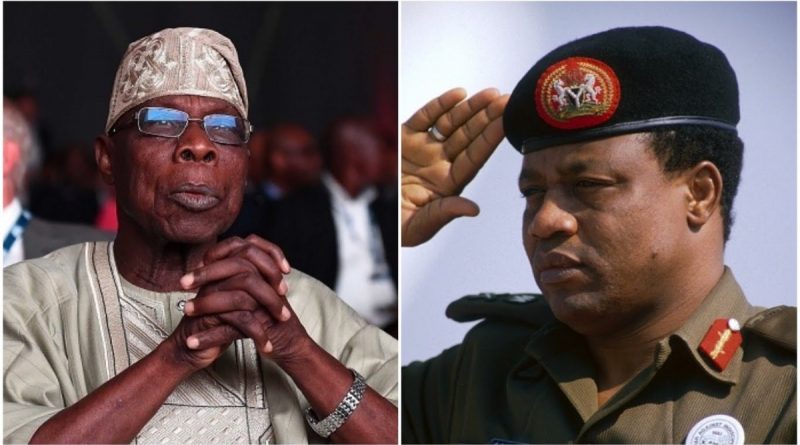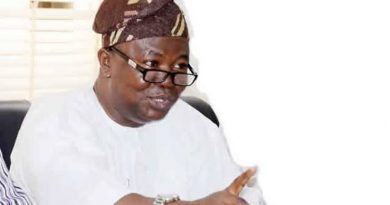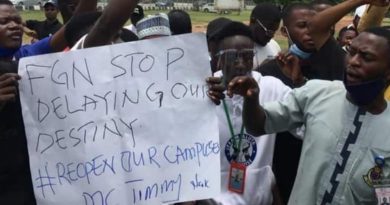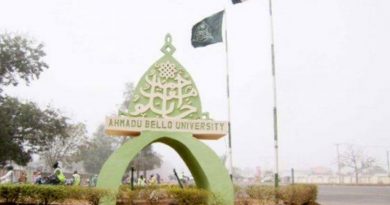ASUU Strike: How OBJ, IBB ruined Nigerian university system –Senate Leader
Leader of the Ninth Senate, Abdullahi Yahaya Abubakar has attributed the genesis of the series of strikes embarked on by the Academic Staff Union of Universities (ASUU) to the effects of the economic policies put in place during administrations of former Presidents Olusegun Obasanjo and General Ibrahim Babangida.
In this exclusive interview with Saturday Sun, the former ABU lecturer and founding member of ASUU, identified how two policies implemented under previous regimes aggravated the problems in the Nigerian University system which led to the series of ASUU strike. He cited the abolition of school fees by ex-President Olusegun Obasanjo and the Structural Adjustment Programme (SAP) by Military President Ibrahim Babangida.

The Kebbi North Senator noted that though the policies had good intentions , they nevertheless affected the University system. Senator Abdullahi also bared his mind on other pertinent national issues like the #EndSARS protests, national security, the Buhari led administration and others. He fielded questions from KENNETH UDEH in Abuja.
Why did you go into politics being a former Head of Department of Rural Sociology in Ahmadu Bello University and a member of the University Senate?
Well, like you rightly said I started my life as a teacher in the university. Then I rose to the position of Head of Department of Agricultural Economics and Rural Sociology Department in the Ahmadu Bello University. From there I went ahead and became a Commissioner and joined the federal civil service and retired as a federal permanent secretary before I went into active politics. To say the fact, I have been one arm in academia and the other arm in politics throughout my life.
Politically, I was a member of the People’s Redemption Party (PRP) in 1978 up until 1981. I was a member of the people who worked with the late Alhaji Balarabe Musa referred to as the past governor of Kaduna state through 1978 and 1981 and I along with other people like the late Bala Usman and others were those who were in government as at that time until after the impeachment. Actually, we were fully involved, I was a member of the Social Democratic Party (SDP) during the aborted transition that brought Abiola’s victory. We campaigned for the SDP, I contested for the national secretary of the party (SDP) but I lost to Sule Lamido at that time. However, the election was annulled and somehow I went back to the civil service and from there I started the service during the military era. After that time, in 1999 when democracy was restored, I was still in the service but I retired in the year 2010 and in 2014 I joined the President’s (President Muhammadu Buhari) party, which was as at then known as the Congress for Progressive Change (CPC).
We campaigned everywhere with the party and the merger with the then Action Congress of Nigeria (ACN) and other political parties was introduced, which brought about today’s All Progressives Congress (APC). We were part of the people who were there when the APC was formed. I played a prominent part in the formation for the APC in my state (Kebbi) and from there I contested for the position of senate and became a Senator in 2015. Basically, academia is also a part of politics, there isn’t much difference; the fact is that academia gives you a platform and knowledge, which will inform your political direction, political action and your political behavior and I worked in academia. I worked in the civil service. I have been dabbling in and out of politics, therefore it’s not something strange to me.
How would describe Nigeria at 60 judging by where we’re coming from as a nation?
Well, the nation received its independence in 1960 but it didn’t stay for long because six years after independence the military took over and remained in power for almost thirty years. That tells you that a lot of things happened which within that period of time affected both the structure of governance and the security of the country and the economy of the country. The major issues that are coming up now are results of those kinds of changes that were accorded by the military at that time.
The changes that occurred at that time generally led to the issues we are facing today as a democratic government. When we talk about democracy, you know people tend to forget that this democracy did not come to Nigerians on a platter of gold. There were people who fought and died for it, in their quest to get the military out of politics. It is also good that we have at least more than twenty years of an uninterrupted civil governance and democracy, whatever you call it, it’s better than what used to happen under our thirty years with the military rule.
The focus now is to deepen the democracy and allow it to work and do the necessary reforms under the democratic governance, never allow a situation whereby you loose the democracy, because if you do, you are not just truncating the labour of those people who fought for it but you are also getting yourself in another dark age, once you loose this democracy. I do not know when you are going to be able to get it again, the issue is to build on what is there and make it work, do the reforms that are necessary to make the democracy work, not to truncate democracy and then start again to start rebuilding it again. There’s no change or restructuring or anything that you cannot do by amending the current constitution. All these people that are talking about restructuring; restructuring what? People have different ideas of what restructuring means. Do people want to go back to the governance structure before independence or do people want to go back to Gowon’s state structure, these are not issues, the issues that are germane to Nigeria is to take the challenges of the moment that are facing us, study the Nigerian constitution now, there are provisions for amendments of the constitution to provide for whatever you want. There are constitutional provisions for; creation of more states, creation of state police, revenue allocation changes, changes in the legislative list to the concurrent list. There’s no change that cannot be implemented in the country, we can change the structures and everything, you can do it through the constitution, so why do you have to abort the democracy? You don’t need to do that, so the issue is to allow the current institution or the democratic institutions to work and work through them so that we can attain whatever goal of restructuring and change we want.
There have been divergent opinions on the performance of President Buhari since his assumption of office in 2015, how would you rate the President’s performance?
We have to be honest, President Buhari inherited a bad situation after so many years of struggle with the military, civilians and everything. He came into office at a time when governance institutions were already overstretched. The fact is that the society had already overgrown governance institutions, security institutions and the security structures that were established since 1967. Therefore, you can see that all these challenges are real, the governance system collapsed, the economy built on oil has also collapsed, the government is operating on a revenue basis which is 40% of what the previous governments were getting. If you want to do justice on the true assessment of this president, you have to realise that the man is operating on the basis of loss of 60% of revenue, even lower than what the government of Jonathan was getting.
However, he is doing much more than what others have done with little, so these are the things that people who are realistic should see, not the kind of things that are here and there. Yes! There are lots of problems with insecurity and of course they are by the way. We have to manage security, the way in which we have managed governance, thereby creating room for a lot of governance spaces and non-state actors to come into the process because the police are not sufficient to handle the security. The people are the ones that can ensure security. It is the people that relate with each other in the local level, that is where security is. When the military came they removed all the traditional institutions and the local people from security and handed it over to the police and the military, in fact the police is too small to handle those issues.
So we have to go back to the drawing board and rejig the architecture of security and local governance, if we don’t change the architecture of security and local governance, we shall still be in trouble. Notwithstanding, like I said, you can do it through amendment of the current constitution, you don’t need to go and start a revolution.
The Nigerian University students have been at home for months now due to the current ASUU strike and this is not the first time; as a public office holder who is a former lecturer and founding member of ASUU, what are the causes and solutions to this recurring industrial action?
Let me cut you short, I was part and parcel of people who created and formed the Academic Staff Union of Universities, what we all know now as ASUU and led it. In fact, I was the Chairman of the Academic Statff Union Universities as a Lecturer in Ahmadu Bello University(ABU), Zaria branch from 1983-1984. I will tell you that we never pressed our agitations through strikes. We agitated for good governance, we also suggested to the government how to go about ruling but we did not down tools. We did not go on strike, somehow when you look at this strike thing it began when other generation of leaders who are more radical than some of us took over the leadership of the union. I do not know what they’re talking about but for me, “when you come to equity, you come with clean hands”. If the universities are not being run the way they should or funded the way they should, we should look at the genesis of what happened. When we were university teachers and university students in the early 70s, the whole issue started with two major events. I am talking about the past events; the first was the abolishing of tuition fees by the federal government under former President Obansanjo. He came and made a declaration that “nobody should pay tuition fee”, saying that students shouldn’t pay tuition. At that time when the government abolished tuition fee, it thought it had that enough funds to take care of universities. The trouble started and there was confusion when the responsibilities of government started growing and manifesting, the university had to rely on the government for funding and the government had no money to fulfill its obligations.
The second policy that destroyed not just the autonomy of the universities but also the resources put in the education sector was during the Ibrahim Babangida regime, Structural Adjustment Programme (SAP). The entire nation woke up one day and discovered that the naira had no value in relation to other foreign currencies because of the structural adjustment policies and programs that were put in place. We at the universities who were there teaching, suddenly we found out that the research grants and the money that should go to university teaching, was not coming to the university anymore. A lot of our foreign partners who were teachers at that time, because they were not able to get enough money in dollars to remit to their parents ran back to their countries. So, we had to come and start managing things, and then the government came and took over, you say parents are not responsible for payment, scholarship systems in states died, everything died because you say you’ve abolished tuition fees; thereby , shifting every responsibility to the government and the government did not have the resources. The government has so many competing demands, so universities really suffered. Now if you say you’re going to restore tuition fees, everybody is going to rise up against you, there’s economic crisis, parents will refuse to pay. If you look at the situation, the universities are now collecting money in several other areas not even tuition, so the university since the abolition of the tuition fee, asides from scholarship, the universities are relying on the government for most of their funding and the government doesn’t have that kind of resources unless we go back, really look at the thing objectively, we’re never going to get out of it.
As the nation is gradually recovering from the effects of EndSARS protests against police brutality, what is your advice to the government at all levels in addressing the issues raised by the youths?
Talking about issues in the Nigerian Police Force, I believe that issues in the police today are all the fault of the government, because even during the military regime, there have been several panels on the reform of the Nigeria Police Force. When I was in the civil service, I served in two of those police reform panels, reports were written about reforming the Nigeria Police Force but, none of the governments implemented any of those reports. It was the government that set up the reforms, that put them under the carpet. There was the Muhammad Danmadami Presidential Committee on Police Reform in May in 2006, there was the special panel on national security, there was also the M.D. Yusufu Presidential Committee on the Reform of the Nigeria Police Force which I was also a member and several other panels before then. These panels were led by police officers and other people who were knowledgeable in security matters. During Jonathan’s regime, they set up another committee under Parry Osayande, they reported and made their submissions but none of them was implemented.
On the #EndSARS, it was of course hijacked by some people who had sinister plans to bring in a revolution into the country. The fact is, you cannot bring a revolution into a country as diverse as Nigeria, and think that you can simply come and overthrow the government. How can you overthrow the government? That means we shall start building all over again? What it means is that if you destabilize this country, you’re destabilizing the entire Central and West Africa. A simple refugee crisis, which will involve at least ten to twenty million Nigerians moving out of Nigeria borders, and there’s no government in central and western Africa that will stay alive. The Libya situation will be a child’s play, those people who think that they can take over Nigeria government by force are jokers, they don’t know the extent of suffering that they’re trying to create for themselves and family, none of them may live to see the success of this country. How many countries do you see that have survived after revolution? Take for example Libya, how many people are there since 2011? Look at Somalia, they are more instructive because Somalia is one ethnic group, one culture but are they stable today? Since crisis happened in the eighties, where are they? And you want to start a revolution in a country like Nigeria, a nation that we’re lucky we’re even able return to democracy where you can be able to make structural changes and do other reforms. We should continue to build the democracy that we have. We agree that things are not well and fine and equitable. However, we need to have a stable government on the basis of which we can be able to reform the economy.
How do we address the issues of insecurity in the country?
It’s the same issue, you have to sit down, reform the security architecture, the governors can come through a constitution amendment and reorganize the way in which security is managed by the people at the local level, eliminate all ungoverned public spaces, and with that we can be able to conquer. Let the people manage security, police is too small to secure people, they can’t provide the security, that is the premise of the army when they did the reform in 1967, that era is gone, we have to go back and build security among the people. In so many places in the world they have security representatives, it’s not like the military.
The military is vertical, it’s high command from the top to the bottom but policing is representative, so different institutions and different places you know, are allow to have their own police force. We have police in counties, even universities have police, towns, cities. So we have to sit down, look at the police force and have federal police, county police, town police, community police and map out ways by which they can relate with each other, so that they can secure people and secure the public space. But this hierarchical policing for the people wouldn’t work, it has not worked, it worked before but not now, we have overgrown it, something has to be done.
For Advert Placement, Sponsorship, support, Article submission, suggestion, etc, Contact us: info@theabusites.com, +2349015751816 (WhatsApp)








